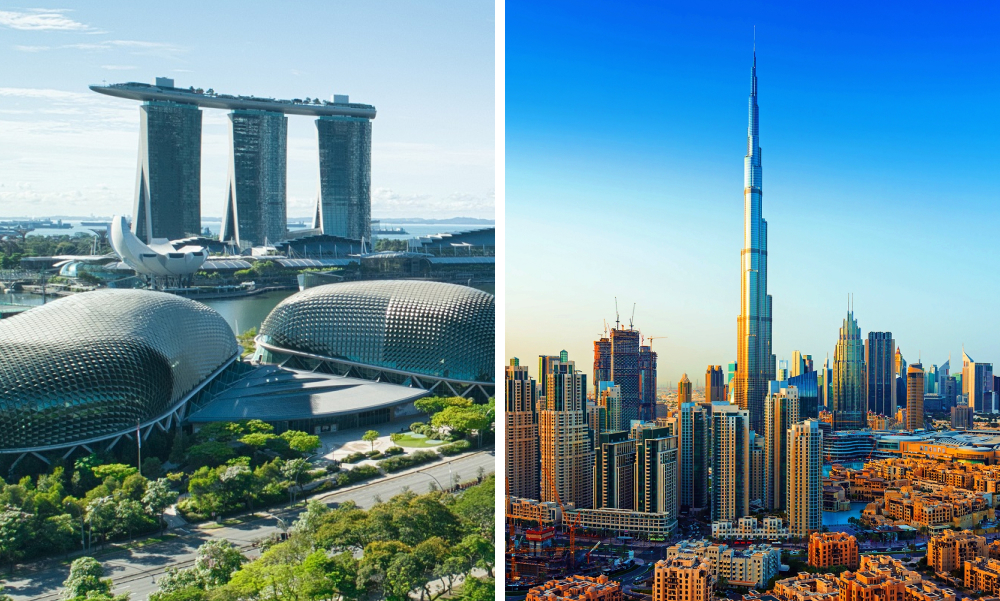When it comes to making a decision about where to live and conduct business, the choice between Singapore and the United Arab Emirates (UAE) often surfaces as a prominent consideration. Both destinations boast thriving economies, strategic geographical locations, and favorable business environments. However, there are distinctive features that differentiate the two, making the decision a nuanced one dependent on individual preferences and business needs.
Economic Landscape:
Singapore, renowned for its robust and diversified economy, stands as a global financial hub. Its strategic location in Southeast Asia, coupled with a pro-business environment and political stability, has attracted multinational corporations and entrepreneurs alike. The city-state offers access to a skilled workforce, advanced infrastructure, and efficient regulatory frameworks conducive to business growth. Additionally, Singapore’s emphasis on innovation and technology further enhances its appeal for startups and established enterprises alike.
On the other hand, the UAE, particularly Dubai and Abu Dhabi, serves as a gateway to the Middle East and North Africa (MENA) region. Fueled by oil wealth initially, the UAE has diversified its economy significantly, with a strong focus on trade, tourism, and finance. Dubai, in particular, has positioned itself as a global business hub, characterized by state-of-the-art infrastructure, free zones offering 100% foreign ownership, and a tax-friendly environment. The UAE’s strategic location between Europe, Asia, and Africa facilitates international trade and investment.
Taxation and Regulatory Environment:
One of the primary considerations for businesses is taxation and regulatory frameworks. Singapore offers a competitive tax regime, with moderate corporate tax rates and numerous tax incentives aimed at fostering business growth. The country has a transparent and efficient regulatory system, ensuring ease of doing business. Additionally, Singapore’s strong legal framework and protection of intellectual property rights provide a secure environment for businesses to thrive.
In contrast, the UAE is known for its tax-free environment, with no corporate or personal income taxes levied at the federal level. This tax advantage, coupled with relaxed regulations in free zones, attracts entrepreneurs and businesses seeking to optimize their tax liabilities. However, it’s essential to navigate the regulatory landscape carefully, as certain sectors may have specific requirements or restrictions.
Quality of Life:
Beyond business considerations, the quality of life plays a significant role in the decision-making process. Singapore offers a high standard of living, characterized by efficient public services, excellent healthcare, safety, and cleanliness. The city-state’s multicultural society provides diverse culinary experiences, vibrant arts and cultural scene, and recreational amenities ranging from lush green spaces to iconic landmarks.
Similarly, the UAE, especially Dubai and Abu Dhabi, boasts a cosmopolitan lifestyle with world-class amenities and infrastructure. Expatriates enjoy a blend of modernity and tradition, with luxury residences, international schools, and recreational facilities catering to diverse interests. The UAE’s dynamic social scene, including luxury shopping malls, fine dining restaurants, and entertainment venues, contributes to its allure as a lifestyle destination.
Conclusion:
In conclusion, both Singapore and the UAE offer compelling advantages for living and conducting business. Singapore excels in its innovation-driven economy, transparent regulatory framework, and high quality of life. It is an ideal choice for businesses seeking a strategic foothold in Asia and access to global markets. On the other hand, the UAE, with its tax incentives, strategic location, and cosmopolitan lifestyle, appeals to entrepreneurs and businesses looking to tap into the Middle East and North Africa region’s opportunities.
Ultimately, the decision between Singapore and the UAE depends on individual priorities, business objectives, and personal preferences. Whether prioritizing access to Asian markets and innovation hubs or leveraging the tax advantages and strategic location in the Middle East, both destinations offer conducive environments for success in business and an exceptional quality of life.
